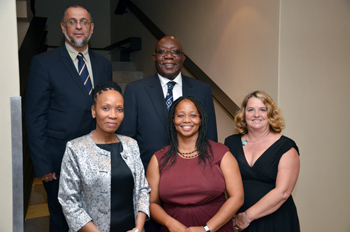Latest News Archive
Please select Category, Year, and then Month to display items
12 October 2020
|
Story Arina Engelbrecht
|
Photo Supplied
 Arina Engelbrecht from Organisational Development and Employee Well-being believes physical activity has a number of benefits for one’s health, including stress relief.
Arina Engelbrecht from Organisational Development and Employee Well-being believes physical activity has a number of benefits for one’s health, including stress relief.
Being physically active plays a big role in preventing the development of mental-health problems and in improving the quality of life of people experiencing mental-health problems.
Treatment for depression
Physical activity can be an alternative treatment for depression. It can be used as a stand-alone treatment or in combination with medication and/or psychological therapy. It promotes all kinds of changes in the brain, including neural growth, reduced inflammation, and new activity patterns are formed that promote feelings of calm and well-being. It releases endorphins – powerful chemicals in the brain that energise your spirit and make you feel good.
Physical activity can be very effective in relieving stress. Research in adults has found that physically active individuals tend to have lower stress levels compared to individuals who are less active. It also leads to improved sleep. When a person sleeps better and feels more rested, overall quality of life improves. They cope better with daily life stressors.
Reduce Alzheimer's risk
Regular physical activity can reduce your risk of developing Alzheimer's disease by up to 50%. It can also slow down further deterioration in those who have already started to develop cognitive problems. It stimulates the brain’s ability to maintain old connections as well as to make new ones.
A study asked people to rate their mood immediately after periods of physical activity (e.g. going for a walk/run, cycling, doing housework) and periods of inactivity (e.g. reading a book or watching television). Researchers found that participants felt more content, more awake, and calmer after being physically active compared to after periods of inactivity.
In conclusion, people who are physically active feel a sense of well-being, feel more energetic throughout the day, sleep better at night, have sharper memories, and feel more relaxed and positive about themselves and their lives.
“Being physically active not only changes your body, it changes your mind,
attitude, and your mood.” – Arina Engelbrecht
Twenty years of human rights - a call for reflection on the successes and challenges
2015-02-25

Back from the left are: Advocate Mohamed Shafie Ameermia, Commissioner, South African Human Rights Commission Advocate Lawrence Mushwana, Chairperson of the South African Human Rights Commission Front from the left are: Honourable Mahube Molemela, Judge President of the Free State High court and Acting judge of the Constitutional Court of South Dr Choice Makhetha, Vice-Rector External Relations, University of the Free State Prof Caroline Nicholson, Dean of the Faculty of Law, University of the Free State |
The South African Human Rights Commission (SAHRC), the Faculty of Law, and the Free State Department of Education hosted a gala dinner on 19 February 2015 to celebrate the launching of the Free State Provincial Division of the SAHRC, reaffirming their collaborative partnership, and confirming the commitment of the Free State Department of Education to community engagement, constitutional rights awareness, and youth advocacy.
The number of human rights abuses reported to the Human Rights Commission in recent years points to the complex nature of the challenges faced by South African communities. What is most disturbing is that the overwhelming majority of these offences are perpetrated by the youth, said Adv Lawrence Moshwana, Chairperson of the South African Human Rights Commission. “The Human Rights Commission is in need of support from government in order to be able to reach all provinces of South Africa”. The expansion of the commission’s services in the Free State and its partnership with the Provincial Department of Education is a great step towards protecting the rights of the most vulnerable communities.
Twenty years of human rights (read the full story)